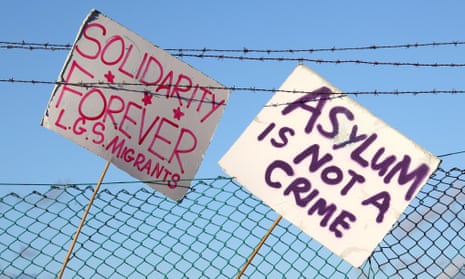A high court judge has found that wages of £1 an hour paid in immigration detention centres are lawful.
Five former immigration detainees challenged the rates of pay. The men’s case was dismissed by Mr Justice Murray on Wednesday, although he said he sympathised with them. They are seeking permission to appeal against the ruling.
The pay rate is less than one-seventh of the legal minimum wage and was described by detainees as “slave labour wages”. However, the judge ruled the rates were acceptable because the purpose of the types of jobs being done, such as cleaning, hairdressing and welfare support, was “to provide meaningful activity and alleviate boredom”. He said no one was compelled to do the work.
Paid work in detention centres is voluntary and detainees do not have to pay for food or accommodation while they are incarcerated. Detention centres, like prisons, are exempt from minimum wage legislation.
In evidence, three of the former detainees who brought the challenge said they had never seen external workers doing cleaning work in the centre, only detainees. They said centre managers would have to pay considerably more to get the work done if detainees did not volunteer.
In a review of pay rates conducted by the Home Office and linked to the legal challenge, one manager said: “When it comes to asking a detainee to put his hand down a toilet to clean or ask[ing them] to clean the body fat buildup in the showers for £1 an hour, then we are often met with the response that you can stuff your job, which is why we have a high turnover for shower cleaners and room cleaners.”
Murray said in his ruling that a common theme in the evidence from the five men was that the rates of pay made them feel exploited.
The rate has remained the same since 2008 when the Home Office standardised work payments, which had previously varied between detention centres. In 2016-17, detainees carried out 887,073 hours of work, for which they were paid £887,565. A very small percentage of them – 0.27% – were paid an enhanced rate of £1.25 an hour for special projects.
Murray said the overarching purpose of the 1999 Immigration Act was to provide “secure but humane accommodation” for detainees and that it was not inhumane to set a fixed rate for work that detainees were not compelled to do.
Toufique Hossain, a director of public law at Duncan Lewis, which brought the legal challenge on behalf of the men, said: “Our clients bravely brought this challenge not just because of what they experienced in detention, but also for the thousands of others who have been, or are currently being, exploited in such a way. Being paid £1 an hour for essential work is obscene. The judgment is disappointing, but we will appeal. This is yet another feature of a harsh, hostile, broken immigration detention system that has to come to an end.”
The Home Office said: “The longstanding practice of offering paid activities to people in immigration detention centres helps to keep them occupied while their removal is being arranged. This practice is not a substitute for the work of trained staff due to the voluntary nature of the roles offered to detainees.
“Whether or not they wish to participate is entirely up to the detainees themselves, but the numbers of detainees volunteering for paid activities across the detention estate is evidence that the jobs are popular.”
